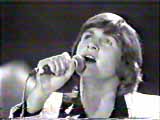 Having won the 1978 contest and hosted the 1979 one,
Israel declined to organize the 1980 “Eurovision Grand Prix”, opening the way
for the Netherlands to take over. Monaco and Israel withdrew from the contest, while
Turkey and – a pleasant surprise – an African/Arab country, Morocco, participated in
the event for the first time, bringing the number of participants up to 19. Well-known
artist Johnny Logan and Chorus & Sax won the Grand Prix with “What’s another
year”, representing Ireland, which became a big hit in Europe and number one in the UK
charts. Participating for the third time, Katja Ebstein was placed 2nd with the song
“Theater”, representing Germany. Having won the 1978 contest and hosted the 1979 one,
Israel declined to organize the 1980 “Eurovision Grand Prix”, opening the way
for the Netherlands to take over. Monaco and Israel withdrew from the contest, while
Turkey and – a pleasant surprise – an African/Arab country, Morocco, participated in
the event for the first time, bringing the number of participants up to 19. Well-known
artist Johnny Logan and Chorus & Sax won the Grand Prix with “What’s another
year”, representing Ireland, which became a big hit in Europe and number one in the UK
charts. Participating for the third time, Katja Ebstein was placed 2nd with the song
“Theater”, representing Germany. |
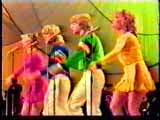 In 1981, Cyprus entered the contest and Israel and
Yugoslavia returned to the fold, while Italy and Morocco decided not to participate. This
brought the number of contestants to 20. The Grand Prix was awarded to Bucks Fizz with
“Making your Mind up”, representing the United Kingdom. Norway finished last with zero
points. Participating for the fourth time, Peter, Sue and Marc finished 4th with “Io
senza te”, representing Switzerland. Egypt decided to broadcast the contest for the
first time. In 1981, Cyprus entered the contest and Israel and
Yugoslavia returned to the fold, while Italy and Morocco decided not to participate. This
brought the number of contestants to 20. The Grand Prix was awarded to Bucks Fizz with
“Making your Mind up”, representing the United Kingdom. Norway finished last with zero
points. Participating for the fourth time, Peter, Sue and Marc finished 4th with “Io
senza te”, representing Switzerland. Egypt decided to broadcast the contest for the
first time. |
 France and Greece withdrew from the 1982 contest,
reducing the number of participants to 18. The Grand Prix was awarded to Nicole with the
song “Ein bisschen frieden”, representing Germany. Finland finished last with zero
points. France and Greece withdrew from the 1982 contest,
reducing the number of participants to 18. The Grand Prix was awarded to Nicole with the
song “Ein bisschen frieden”, representing Germany. Finland finished last with zero
points. |
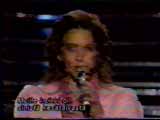 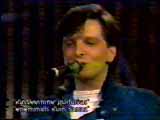 Ireland decided not to participate in the 1983 contest,
while France, Greece and Italy made their comeback and brought the number of contestants
up to 20. The Grand Prix was awarded to Corinne Hermes with “Si la vie est cadeau”,
representing Luxembourg, which became a big hit in France. Other artists were Carola
Haeggkvist, with the song “Fraemling”, representing Sweden, who was placed 3rd and
became a star in her region, and Danijel Popovic, with “Julie”, representing
Yugoslavia, who finished 4th. Ofra Haza, with “Hi”, representing Israel, was placed
2nd, and it was only later that she became a star and chart-topper across Europe with the
big hit “Im nin'alu”. Spain and Turkey tied for last place, scoring zero points.
Australia broadcast the contest for the first time. Ireland decided not to participate in the 1983 contest,
while France, Greece and Italy made their comeback and brought the number of contestants
up to 20. The Grand Prix was awarded to Corinne Hermes with “Si la vie est cadeau”,
representing Luxembourg, which became a big hit in France. Other artists were Carola
Haeggkvist, with the song “Fraemling”, representing Sweden, who was placed 3rd and
became a star in her region, and Danijel Popovic, with “Julie”, representing
Yugoslavia, who finished 4th. Ofra Haza, with “Hi”, representing Israel, was placed
2nd, and it was only later that she became a star and chart-topper across Europe with the
big hit “Im nin'alu”. Spain and Turkey tied for last place, scoring zero points.
Australia broadcast the contest for the first time. |
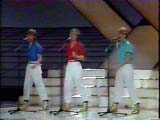 Greece and Israel decided not to participate in the 1984 contest,
however Ireland joined in again and brought the number of contestants up to 19. The Grand
Prix was awarded to the Herrey', with “Diggi-loo-diggi-ley”, representing Sweden. Greece and Israel decided not to participate in the 1984 contest,
however Ireland joined in again and brought the number of contestants up to 19. The Grand
Prix was awarded to the Herrey', with “Diggi-loo-diggi-ley”, representing Sweden. |
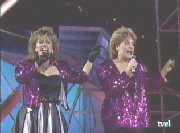 In the 1985 contest, the Netherlands and Yugoslavia
decided not to participate while Greece and Israel returned, keeping the number of
contestants at 19. The Grand Prix was awarded to Bobbysocks, with “La det swinge”,
representing Norway. For the first time the transmission of the contest was
satellite-only. In the 1985 contest, the Netherlands and Yugoslavia
decided not to participate while Greece and Israel returned, keeping the number of
contestants at 19. The Grand Prix was awarded to Bobbysocks, with “La det swinge”,
representing Norway. For the first time the transmission of the contest was
satellite-only. |
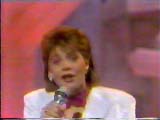 Greece and Italy withdrew from the 1986 contest,
however the Netherlands, Yugoslavia and – for the first time – Iceland took part in
the event, bringing the number of participants up to 20. That year, 15-year-old Sandra Kim
won the Grand Prix with ease, scoring 176 points with “J’aime la vie”, representing
Belgium. The Eurovision Song Contest celebrated its 30th anniversary. Greece and Italy withdrew from the 1986 contest,
however the Netherlands, Yugoslavia and – for the first time – Iceland took part in
the event, bringing the number of participants up to 20. That year, 15-year-old Sandra Kim
won the Grand Prix with ease, scoring 176 points with “J’aime la vie”, representing
Belgium. The Eurovision Song Contest celebrated its 30th anniversary. |
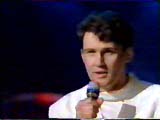 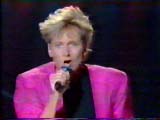 Due to friction between the French-language
television station RTBF and the Dutch-language BRTN, a choice had to be made as to who was
going to produce the 1987 “Eurovision Grand Prix”. After some deliberation, it
was decided that RTBF would be that year’s host country. The return of Greece and Italy
brought the number of participants up to 22. The Grand Prix was awarded to star performer
Johnny Logan, with “Hold Me Now”, representing Ireland. Plastic Bertrand came 21st
with “Amour-Amour”, representing Luxembourg. He was already a major pop star in the
French-speaking world, with hits such as “Ça plane pour moi”. Umberto Tozzi finished
3rd with “Gente di mare”, representing Italy. Due to friction between the French-language
television station RTBF and the Dutch-language BRTN, a choice had to be made as to who was
going to produce the 1987 “Eurovision Grand Prix”. After some deliberation, it
was decided that RTBF would be that year’s host country. The return of Greece and Italy
brought the number of participants up to 22. The Grand Prix was awarded to star performer
Johnny Logan, with “Hold Me Now”, representing Ireland. Plastic Bertrand came 21st
with “Amour-Amour”, representing Luxembourg. He was already a major pop star in the
French-speaking world, with hits such as “Ça plane pour moi”. Umberto Tozzi finished
3rd with “Gente di mare”, representing Italy. |
 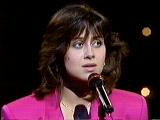 With the withdrawal of Cyprus, the number of contestants
in the 1988 contest fell to 21. One major change occurred in the rules with regard
to the national jury for the European final. The membership of each national jury was
increased to sixteen, composed of an equal number of men and women, while four members had
to be aged between 15 and 25, four between 26 and 35, four between 36 and 45 and four in
the age group 46-60 and over. The jury membership was still to exclude professional
composers, music publishers, record manufacturers, professional musicians, singers and any
person with interests in the music industry, as well as members of staff from
participating organizations or any person in contact with those organizations in the field
of light entertainment. Each national jury member was allocated 1 to 10 points to award to
each of their preferred songs. However, the final votes to be announced on TV remained the
same. With the withdrawal of Cyprus, the number of contestants
in the 1988 contest fell to 21. One major change occurred in the rules with regard
to the national jury for the European final. The membership of each national jury was
increased to sixteen, composed of an equal number of men and women, while four members had
to be aged between 15 and 25, four between 26 and 35, four between 36 and 45 and four in
the age group 46-60 and over. The jury membership was still to exclude professional
composers, music publishers, record manufacturers, professional musicians, singers and any
person with interests in the music industry, as well as members of staff from
participating organizations or any person in contact with those organizations in the field
of light entertainment. Each national jury member was allocated 1 to 10 points to award to
each of their preferred songs. However, the final votes to be announced on TV remained the
same. The Grand Prix was
awarded to a major star, Céline Dion, with "Ne partez pas sans moi",
representing Switzerland. Other well-known artists included Lara Fabian, placed 4th with
"Croire", representing Luxembourg, and Gérard Lenorman, 10th with
"Chanteur de charme", representing France. |
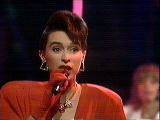 In 1989, all the 21 countries from the year before
participated in the contest, plus Cyprus making its comeback, which brought the number up
to 22. For that year the rules were changed to set an age limit of 16 for entrants, in
view of the youth of the performers Gili, representing Israel, and Nathalie Paque,
representing France. The Grand Prix was won by Yugoslavia, presenting a song with an
attractive pop beat. The song was "Rock me" performed by Riva. In 1989, all the 21 countries from the year before
participated in the contest, plus Cyprus making its comeback, which brought the number up
to 22. For that year the rules were changed to set an age limit of 16 for entrants, in
view of the youth of the performers Gili, representing Israel, and Nathalie Paque,
representing France. The Grand Prix was won by Yugoslavia, presenting a song with an
attractive pop beat. The song was "Rock me" performed by Riva. |

 Having won the 1978 contest and hosted the 1979 one,
Israel declined to organize the 1980 “Eurovision Grand Prix”, opening the way
for the Netherlands to take over. Monaco and Israel withdrew from the contest, while
Turkey and – a pleasant surprise – an African/Arab country, Morocco, participated in
the event for the first time, bringing the number of participants up to 19. Well-known
artist Johnny Logan and Chorus & Sax won the Grand Prix with “What’s another
year”, representing Ireland, which became a big hit in Europe and number one in the UK
charts. Participating for the third time, Katja Ebstein was placed 2nd with the song
“Theater”, representing Germany.
Having won the 1978 contest and hosted the 1979 one,
Israel declined to organize the 1980 “Eurovision Grand Prix”, opening the way
for the Netherlands to take over. Monaco and Israel withdrew from the contest, while
Turkey and – a pleasant surprise – an African/Arab country, Morocco, participated in
the event for the first time, bringing the number of participants up to 19. Well-known
artist Johnny Logan and Chorus & Sax won the Grand Prix with “What’s another
year”, representing Ireland, which became a big hit in Europe and number one in the UK
charts. Participating for the third time, Katja Ebstein was placed 2nd with the song
“Theater”, representing Germany. In 1981, Cyprus entered the contest and Israel and
Yugoslavia returned to the fold, while Italy and Morocco decided not to participate. This
brought the number of contestants to 20. The Grand Prix was awarded to Bucks Fizz with
“Making your Mind up”, representing the United Kingdom. Norway finished last with zero
points. Participating for the fourth time, Peter, Sue and Marc finished 4th with “Io
senza te”, representing Switzerland. Egypt decided to broadcast the contest for the
first time.
In 1981, Cyprus entered the contest and Israel and
Yugoslavia returned to the fold, while Italy and Morocco decided not to participate. This
brought the number of contestants to 20. The Grand Prix was awarded to Bucks Fizz with
“Making your Mind up”, representing the United Kingdom. Norway finished last with zero
points. Participating for the fourth time, Peter, Sue and Marc finished 4th with “Io
senza te”, representing Switzerland. Egypt decided to broadcast the contest for the
first time. France and Greece withdrew from the 1982 contest,
reducing the number of participants to 18. The Grand Prix was awarded to Nicole with the
song “Ein bisschen frieden”, representing Germany. Finland finished last with zero
points.
France and Greece withdrew from the 1982 contest,
reducing the number of participants to 18. The Grand Prix was awarded to Nicole with the
song “Ein bisschen frieden”, representing Germany. Finland finished last with zero
points.
 Ireland decided not to participate in the 1983 contest,
while France, Greece and Italy made their comeback and brought the number of contestants
up to 20. The Grand Prix was awarded to Corinne Hermes with “Si la vie est cadeau”,
representing Luxembourg, which became a big hit in France. Other artists were Carola
Haeggkvist, with the song “Fraemling”, representing Sweden, who was placed 3rd and
became a star in her region, and Danijel Popovic, with “Julie”, representing
Yugoslavia, who finished 4th. Ofra Haza, with “Hi”, representing Israel, was placed
2nd, and it was only later that she became a star and chart-topper across Europe with the
big hit “Im nin'alu”. Spain and Turkey tied for last place, scoring zero points.
Australia broadcast the contest for the first time.
Ireland decided not to participate in the 1983 contest,
while France, Greece and Italy made their comeback and brought the number of contestants
up to 20. The Grand Prix was awarded to Corinne Hermes with “Si la vie est cadeau”,
representing Luxembourg, which became a big hit in France. Other artists were Carola
Haeggkvist, with the song “Fraemling”, representing Sweden, who was placed 3rd and
became a star in her region, and Danijel Popovic, with “Julie”, representing
Yugoslavia, who finished 4th. Ofra Haza, with “Hi”, representing Israel, was placed
2nd, and it was only later that she became a star and chart-topper across Europe with the
big hit “Im nin'alu”. Spain and Turkey tied for last place, scoring zero points.
Australia broadcast the contest for the first time. Greece and Israel decided not to participate in the 1984 contest,
however Ireland joined in again and brought the number of contestants up to 19. The Grand
Prix was awarded to the Herrey', with “Diggi-loo-diggi-ley”, representing Sweden.
Greece and Israel decided not to participate in the 1984 contest,
however Ireland joined in again and brought the number of contestants up to 19. The Grand
Prix was awarded to the Herrey', with “Diggi-loo-diggi-ley”, representing Sweden. In the 1985 contest, the Netherlands and Yugoslavia
decided not to participate while Greece and Israel returned, keeping the number of
contestants at 19. The Grand Prix was awarded to Bobbysocks, with “La det swinge”,
representing Norway. For the first time the transmission of the contest was
satellite-only.
In the 1985 contest, the Netherlands and Yugoslavia
decided not to participate while Greece and Israel returned, keeping the number of
contestants at 19. The Grand Prix was awarded to Bobbysocks, with “La det swinge”,
representing Norway. For the first time the transmission of the contest was
satellite-only.  Greece and Italy withdrew from the 1986 contest,
however the Netherlands, Yugoslavia and – for the first time – Iceland took part in
the event, bringing the number of participants up to 20. That year, 15-year-old Sandra Kim
won the Grand Prix with ease, scoring 176 points with “J’aime la vie”, representing
Belgium. The Eurovision Song Contest celebrated its 30th anniversary.
Greece and Italy withdrew from the 1986 contest,
however the Netherlands, Yugoslavia and – for the first time – Iceland took part in
the event, bringing the number of participants up to 20. That year, 15-year-old Sandra Kim
won the Grand Prix with ease, scoring 176 points with “J’aime la vie”, representing
Belgium. The Eurovision Song Contest celebrated its 30th anniversary. 
 Due to friction between the French-language
television station RTBF and the Dutch-language BRTN, a choice had to be made as to who was
going to produce the 1987 “Eurovision Grand Prix”. After some deliberation, it
was decided that RTBF would be that year’s host country. The return of Greece and Italy
brought the number of participants up to 22. The Grand Prix was awarded to star performer
Johnny Logan, with “Hold Me Now”, representing Ireland. Plastic Bertrand came 21st
with “Amour-Amour”, representing Luxembourg. He was already a major pop star in the
French-speaking world, with hits such as “Ça plane pour moi”. Umberto Tozzi finished
3rd with “Gente di mare”, representing Italy.
Due to friction between the French-language
television station RTBF and the Dutch-language BRTN, a choice had to be made as to who was
going to produce the 1987 “Eurovision Grand Prix”. After some deliberation, it
was decided that RTBF would be that year’s host country. The return of Greece and Italy
brought the number of participants up to 22. The Grand Prix was awarded to star performer
Johnny Logan, with “Hold Me Now”, representing Ireland. Plastic Bertrand came 21st
with “Amour-Amour”, representing Luxembourg. He was already a major pop star in the
French-speaking world, with hits such as “Ça plane pour moi”. Umberto Tozzi finished
3rd with “Gente di mare”, representing Italy. 
 With the withdrawal of Cyprus, the number of contestants
in the 1988 contest fell to 21. One major change occurred in the rules with regard
to the national jury for the European final. The membership of each national jury was
increased to sixteen, composed of an equal number of men and women, while four members had
to be aged between 15 and 25, four between 26 and 35, four between 36 and 45 and four in
the age group 46-60 and over. The jury membership was still to exclude professional
composers, music publishers, record manufacturers, professional musicians, singers and any
person with interests in the music industry, as well as members of staff from
participating organizations or any person in contact with those organizations in the field
of light entertainment. Each national jury member was allocated 1 to 10 points to award to
each of their preferred songs. However, the final votes to be announced on TV remained the
same.
With the withdrawal of Cyprus, the number of contestants
in the 1988 contest fell to 21. One major change occurred in the rules with regard
to the national jury for the European final. The membership of each national jury was
increased to sixteen, composed of an equal number of men and women, while four members had
to be aged between 15 and 25, four between 26 and 35, four between 36 and 45 and four in
the age group 46-60 and over. The jury membership was still to exclude professional
composers, music publishers, record manufacturers, professional musicians, singers and any
person with interests in the music industry, as well as members of staff from
participating organizations or any person in contact with those organizations in the field
of light entertainment. Each national jury member was allocated 1 to 10 points to award to
each of their preferred songs. However, the final votes to be announced on TV remained the
same.  In 1989, all the 21 countries from the year before
participated in the contest, plus Cyprus making its comeback, which brought the number up
to 22. For that year the rules were changed to set an age limit of 16 for entrants, in
view of the youth of the performers Gili, representing Israel, and Nathalie Paque,
representing France. The Grand Prix was won by Yugoslavia, presenting a song with an
attractive pop beat. The song was "Rock me" performed by Riva.
In 1989, all the 21 countries from the year before
participated in the contest, plus Cyprus making its comeback, which brought the number up
to 22. For that year the rules were changed to set an age limit of 16 for entrants, in
view of the youth of the performers Gili, representing Israel, and Nathalie Paque,
representing France. The Grand Prix was won by Yugoslavia, presenting a song with an
attractive pop beat. The song was "Rock me" performed by Riva.